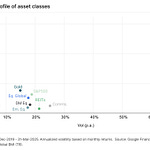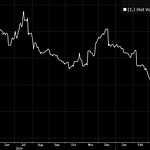If you are not a subscriber of The Pomp Letter, join 215,000 other investors who read my personal opinion on finance, technology, and bitcoin each morning.
To investors,
There are various schools of thought in business, finance, and politics. Some people believe in free markets as a self-correcting mechanism, while others believe that market intervention is a better pursuit. Each of these ideas can be taken to the extreme — free market believers become anarchists and market interventionists become communists.
Extremism in either direction has historically led to magnified problems in a society, so we’ll refrain from including those in this analysis. If we simply evaluate market intervention vs free markets, I believe we are beginning to see a recurring theme in the digital economy.
First, the federal minimum wage in the United States is $7.25 and hasn’t changed since July 2009. Each state has their own minimum wage requirements as well, which range from no minimum wage (Mississippi, South Carolina, Tennessee, Louisiana) to $5.15 (Georgia) to $15 an hour (California and New York). Barring California and New York, which only require $15 an hour for a small selection of businesses in their state, there are no states that have successfully achieved the $15 per hour minimum wage that is constantly floated by politicians on the campaign trail.
This is noteworthy because numerous studies highlight that approximately 80% of American workers are now paid at least $15 an hour. Andrew Van Dam and Heather Long from the Washington Post explained last August:
“The U.S. labor market hit a new milestone recently: For the first time, average pay in restaurants and supermarkets climbed above $15 an hour. Wages have been rising rapidly as the economy reopens and businesses struggle to hire enough workers. Some of the biggest gains have gone to workers in some of the lowest-paying industries.
Overall, nearly 80 percent of U.S. workers now earn at least $15 an hour, up from 60 percent in 2014. Job sites and recruiting firms say many job seekers won’t even consider jobs that pay less than $15 anymore. For years, low-paid workers fought to make at least that much. Now it has effectively become the new baseline.”
So the politicians and regulators, who are acting as market interventionists, have been unsuccessful in achieving a $15 minimum wage at the federal or state level. At the same time, the free market has already driven the effective minimum wage for workers past that milestone. This is a classic example of the free market driving results while the market interventionists are bogged down in bureaucracy and politics.
Another example of this comparison is in the accredited investor rules within the United States. Currently, only investors that meet specific wealth and income milestones are eligible to invest in private market opportunities. These opportunities traditionally fall in the private equity or venture capital bucket, but can include real estate or debt offerings in certain instances as well.
Many people in positions of power and influence have discussed evolving these rules to allow more individuals to participate in these investment opportunities. Ideas have ranged from a knowledge-based test to lower wealth and income level requirements.
While the regulatory and political apparatus continues to discuss potential solutions, the free market has found a unique solution. Bitcoin was launched as a decentralized asset that was rooted in open source software. There was no need to adhere to securities law because there was no team or individual that personally benefitted from the creation, launch, and scaling of the asset.
While the asset failed to meet the securities framework, it provided the single best investment return over the last decade. These venture capital style returns meant that anyone in the world with an internet connection, regardless of wealth or income, finally had the opportunity to capture private market returns. The free market figured out how to democratize access to investment opportunities without the need to wait for the market interventionists to create the solution.
It would be difficult for every asset in the private market to become a decentralized, open source software solution, so there are still challenges in the market, especially when you evaluate this solution for its ability to be replicated. With that said, the free market still was able to create a solution that addressed one of the hardest problems to solve in financial markets.
These two examples show that the free market has the potential to create solutions before the market interventionists. It isn’t a guarantee and there are still questions about which approach can create the solution faster, but it is hard to ignore the efficacy of free markets in the digital economy. When you overlay the complexity across jurisdictions and geographies, the free market may actually be a better governor of the various aspects in this new world.
Humans always want to feel like they’re doing something. They are solving problems. They are addressing bad situations. They are constantly in control. But the truth is that sometimes the free market outperforms humans, which is worth celebrating.
Hope each of you has a great day. I’ll talk to everyone tomorrow.
-Pomp
If you are not a subscriber of The Pomp Letter, join 215,000 other investors who read my personal opinion on finance, technology, and bitcoin each morning.
SPONSORED: Brave Wallet is the first secure wallet built natively in a web3 crypto browser. No extension required.
With Brave Wallet, you can buy, store, send, and swap assets. Manage your portfolio & NFTs. View real-time market data with an integrated CoinGecko dashboard. Even connect other wallets and DApps. All from the security of the best privacy browser on the market.
Protect your crypto. Whether you’re new to crypto, or a seasoned pro, it’s time to ditch those risky extensions. It’s time to switch to Brave Wallet.
Download Brave at brave.com/Pomp, and click the wallet icon to get started.
Jeff Richards is a Managing Partner at GGV Capital
In this conversation, we discuss the best advice for founders in this fast changing macro environment, to the performance of various asset markets, and what he's currently observing as potential investment opportunities.
Listen on iTunes: Click here
Listen on Spotify: Click here
BlackRock Is Going BIG Into Bitcoin!
Podcast Sponsors
These companies make the podcast possible, so go check them out and thank them for their support!
Bitcoin 2022 is the largest Bitcoin event in the world that takes place 4/6 - 4/9 in Miami Beach. Click HERE to learn more and use promo code POMP for 10% off.
Fundrise is largest direct-to-investor real estate investment platform. Go to Fundrise.com/Pomp today and get $10 when you place your first investment.
Unstoppable Domains’ 10 NFT domain endings are now fully integrated with Trust Wallet. Claim your Unstoppable Domain here today.
Brave Wallet is the first secure crypto wallet built natively in a web3 crypto browser. Download the Brave privacy browser at brave.com/Pomp today.
Abra lets you trade, borrow, and earn interest on crypto. Earn up to 13% interest on USD stablecoins or crypto, borrow USD stablecoins, and trade in 110+ cryptocurrencies in a simple, secure app. Download Abra and get $15 in free crypto when you fund your account.
FTX US is the safe, regulated way to buy digital assets. Trade crypto with up to 85% lower fees than top competitors by signing up at FTX.US today.
Compass Mining is the world's first online marketplace for bitcoin mining hardware and hosting. Visit compassmining.io to start mining bitcoin today!
Choice is rebuilding the way bitcoiners approach retirement by making it possible to invest in digital assets inside your IRA. Visit choiceapp.io/pomp
BlockFi provides financial products for crypto investors. Those products include BlockFi Wallet, no fee Trading, crypto collateralized Loans and the World's First Crypto Rewards Credit Card. To get $75 back on the first swipe of your BlockFi Rewards Credit Card, sign up today at http://www.blockfi.com/Pompcc
LMAX Digital is the market-leading solution for institutional crypto trading & custodial services. Learn more at LMAXdigital.com/pomp
Okcoin is the first licensed exchange to bring new cryptos to market. To get started, and go to okcoin.com/pomp
Exodus is the world’s leading desktop, mobile, and hardware crypto wallets, with over 150 assets. Founded in 2015 to empower people to control their wealth. Visithttp://exodus.com/pomp today.
You are receiving The Pomp Letter because you either signed up or you attended one of the events that I spoke at. Feel free to unsubscribe if you aren’t finding this valuable. Nothing in this email is intended to serve as financial advice. Do your own research.














Share this post